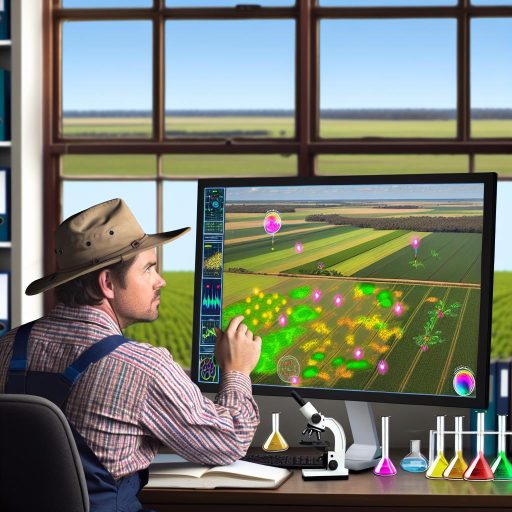Introduction
Sustainable farming refers to agricultural practices that maintain productivity while preserving environmental health.
It promotes biodiversity, conserves resources, and focuses on social equity.
In Australia, sustainable farming plays a vital role due to its unique ecosystems and climate challenges.
Importance of sustainable farming in the context of Australia
The importance of sustainable farming in Australia cannot be overstated.
The country faces climate change, soil degradation, and water scarcity.
By adopting sustainable practices, farmers can enhance resilience against these threats.
This approach not only protects natural resources but also ensures food security for future generations.
As Australia moves toward greener practices, the demand for careers in sustainable farming increases.
Young professionals seek opportunities that align with their values and passions.
The growth of the eco-conscious consumer market further drives this demand.
Many businesses now prioritize sustainability in operations, creating jobs across various sectors.
Positions in sustainable farming range from agronomists and ecologists to farm managers and educators.
These roles require a mix of practical skills and innovative thinking.
Emerging technologies, such as precision agriculture and hydroponics, also open new career pathways.
Workers in this field focus on efficiency while minimizing environmental impact.
Moreover, government initiatives and funding bolster the importance of sustainability in agriculture.
Programs aimed at reducing emissions and promoting clean energy create a favorable environment for job seekers.
Universities and institutions increasingly offer courses on sustainable farming practices and technologies.
Additionally, career prospects in sustainable farming extend beyond the farm.
Advocacy groups and non-profit organizations play a crucial role.
They work to raise awareness and drive policy changes.
Hence, individuals passionate about sustainability can contribute meaningfully to both local communities and global efforts.
In short, sustainable farming represents a significant opportunity for career growth in Australia.
As environmental challenges increase, so does the need for dedicated professionals.
By engaging in this sector, individuals can influence the future of agriculture positively.
The Current State of Agriculture in Australia
Overview of Traditional Farming Practices
Farming in Australia has deep historical roots.
Traditional farming methods largely shaped the landscape and economy.
These practices involved monocultures, heavy tillage, and chemical inputs.
Farmers relied on these methods to increase yield and productivity.
However, many challenges arose from these practices over time.
- Monoculture: Farmers often planted a single crop over vast areas.
This approach reduced biodiversity and made crops vulnerable to pests. - Heavy Tillage: Intensive soil plowing disrupted soil structure.
It led to erosion and loss of organic matter. - Chemical Inputs: The use of fertilizers and pesticides boosted short-term yields.
However, they caused long-term soil degradation and water pollution. - Water Usage: Traditional methods often maximized water consumption.
Inefficient irrigation contributed to depletion of local water sources.
These traditional farming practices dominated Australian agriculture for decades.
They achieved remarkable productivity gains but were not sustainable in the long run.
Consequently, many farmers began to notice the adverse effects on soil health and the environment.
Environmental Challenges Faced by the Agricultural Sector
The agricultural sector in Australia currently faces significant environmental challenges.
Rising pressure from climate change highlights the need for better practices.
Australia experiences extreme weather patterns, which impact agricultural yields.
- Drought Conditions: Frequent droughts reduce water availability for crops.
They lead to decreased productivity and increased stress on farmers. - Soil Degradation: Constant tilling and chemical use degrade soil quality.
Poisoned soils lose fertility, leading to lower crop yields. - Biodiversity Loss: The decline in native flora and fauna affects ecosystems.
Agricultural expansion replaces natural habitats with monocultures. - Water Scarcity: Over-extraction of water for irrigation strains local supplies.
The competition for water exacerbates tensions in rural communities. - Climate Change Impact: Rising temperatures and erratic rainfall patterns challenge farming viability.
Many producers grapple with adjusting their practices to meet these changes.
These environmental challenges demand immediate attention.
Farmers must consider alternative practices to protect resources and ensure future sustainability.
Introduction to Sustainable Farming Techniques
Sustainable farming emerged as a response to the challenges faced by traditional agriculture.
It promotes practices that nourish the environment and support agricultural productivity.
Sustainable farming embraces various techniques designed to improve resilience and adaptability.
- Crop Rotation: This technique involves alternating different crops in a specific sequence.
Crop rotation prevents pest cycles and improves soil health. - Cover Cropping: Farmers plant cover crops during off-seasons.
These crops protect the soil from erosion and enhance organic matter content. - No-Till Farming: This method minimizes soil disturbance.
Farmers leave crop residue on fields, preserving moisture and nutrients. - Integrated Pest Management: Farmers utilize natural predators to manage pests.
This approach reduces reliance on chemical pesticides. - Agroforestry: This technique integrates trees and shrubs into farming systems.
It enhances biodiversity while improving crop yields and soil health. - Organic Farming: Farmers cultivate crops without synthetic fertilizers or pesticides.
Organic methods promote healthier ecosystems and food consumption. - Water Management: Sustainable irrigation practices optimize water use.
Techniques like drip irrigation significantly enhance efficiency. - Precision Agriculture: Farmers leverage technology to monitor crop health.
Remote sensing and data analysis lead to more informed decisions.
By adopting sustainable farming techniques, Australian farmers can shield the environment while maintaining productivity.
These methods not only safeguard natural resources but also offer economic viability for the future.
In essence, the current state of agriculture in Australia necessitates a shift towards sustainable practices.
Environmental challenges like drought, soil degradation, and climate change drive this transformation.
Embracing sustainable techniques empowers farmers to enhance biodiversity and soil health, along with optimizing water usage.
Together, these efforts will pave the way for a resilient agricultural framework in Australia, ensuring food security and environmental sustainability for generations to come.
Career Opportunities in Sustainable Farming
Sustainable farming offers diverse career paths.
Each path contributes to environmental stewardship.
Individuals passionate about agriculture find numerous opportunities.
Below are some key roles in sustainable farming.
Your Personalized Career Strategy
Unlock your potential with tailored career consulting. Get clear, actionable steps designed for your success. Start now!
Get StartedOverview of Different Career Paths
- Agronomist: Agronomists specialize in soil management and crop production.
They study agricultural systems to enhance yields sustainably.
They often work with farmers on crop selection and soil conservation methods. - Farm Manager: Farm managers oversee daily operations on sustainable farms.
They implement practices that reduce environmental impact.
They also manage resources, budgets, and personnel effectively. - Sustainability Consultant: Sustainability consultants advise businesses on eco-friendly practices.
They analyze operations and suggest improvements.
Their goal is to help farms reduce waste and increase efficiency. - Research Scientist: Research scientists focus on innovative solutions in agriculture.
They conduct studies on crop varieties and pest management.
Their findings contribute to creating more sustainable farming systems. - Environmental Educator: Environmental educators teach sustainable practices.
They work in schools or community programs.
Their goal is to raise awareness about sustainable agriculture among the public.
Emerging Roles in Technology and Research
Technology plays a crucial role in advancing sustainable farming.
Emerging technology creates new job opportunities.
Here are some notable roles:
- Precision Agriculture Specialist: These specialists use technology for efficient farming.
They implement GPS and sensor technologies.
They optimize field-level management regarding crop farming. - Data Analyst: Data analysts collect and interpret agricultural data.
They evaluate agricultural performance metrics.
Their insights help farmers make informed decisions on resource allocation. - Drone Operator: Drones are revolutionizing how farmers monitor crops.
Operators utilize drone technology for aerial imaging.
They assess plant health and optimize irrigation practices remotely. - Agroecologist: Agroecologists study agricultural ecosystems.
They focus on the interrelationships in biodiversity and sustainable practices.
Their research can influence policy decisions and farm management strategies. - Biotechnology Researcher: These researchers explore plant genetics.
They aim to develop sustainable crop varieties.
Their work can enhance food security while addressing climate change challenges.
Case Studies of Successful Sustainable Farming Initiatives
Real-world examples illustrate the success of sustainable farming.
These case studies offer insights into effective practices.
- Farmers for Climate Action: This initiative connects farmers seeking sustainable practices.
They promote adapting to climate change through knowledge sharing.
Farmers learn new techniques for managing water and soil efficiently. - Regenerative Agriculture Programs: These programs focus on restoring soil health.
Farmers apply techniques that enhance biodiversity and ecosystem services.
This initiative showcases the long-term benefits of soil regeneration. - Carbon Farming Initiatives: Carbon farming offers farmers financial incentives.
They implement practices that sequester carbon in soils.
Successful pilots illustrate profitability while benefiting the environment. - Community Supported Agriculture (CSA): CSAs connect consumers directly to farmers.
This model fosters local food systems and reduces transportation emissions.
It encourages consumers to support sustainable practices. - Integrated Pest Management (IPM) Programs: IPM combines biological, cultural, and chemical tools.
Farmers learn to minimize pest damage while reducing chemical use.
Successful farms demonstrate how to balance productivity and sustainability.
Sustainable farming opens a realm of career opportunities.
Each role contributes uniquely to environmental health.
As technology advances, new paths emerge in research and farming practices.
Real success stories demonstrate the effectiveness of sustainable approaches.
Individuals who choose careers in sustainable farming will shape the future of agriculture.
They will drive innovations that foster environmental stewardship.
Their work will ensure a healthy planet for future generations.
Read: Top Aussie Agriculture Jobs: In-Demand Roles in 2024
Necessary Skills and Qualifications
Pursuing a career in sustainable farming in Australia presents exciting opportunities.
However, individuals need to equip themselves with specific skills and qualifications.
These tools enable agricultural professionals to succeed in a rapidly evolving industry.
Educational Pathways
Obtaining relevant education is vital for anyone interested in sustainable farming careers.
Both universities and vocational training institutions offer programs that cater to different aspects of agriculture.
Universities
- Several universities offer degrees in agricultural science, environmental studies, and sustainable agriculture.
- Courses cover topics such as soil science, crop management, and sustainable practices.
- Students can also pursue research opportunities that focus on innovative farming techniques.
Vocational Training
- TAFE institutions provide vocational education in agriculture and related fields.
- Qualifications range from certificates in horticulture to diplomas in sustainable farming.
- Training programs often emphasize practical skills and hands-on experience.
Choosing the right educational pathway is essential.
Prospective students should evaluate their career goals and identify suitable programs.
Importance of Specialized Training in Sustainable Agriculture
In addition to formal education, specialized training enhances an individual’s qualifications.
Focused training ensures that farmers develop expertise in sustainable practices.
Awareness of global agricultural challenges increases every day.
Specialty training could include:
- Organic farming techniques.
- Water management strategies.
- Soil health maintenance practices.
- Integrated pest management systems.
- Workshops and short courses are valuable resources.
They often feature prominent speakers and industry professionals. - Networking opportunities arise during specialized training.
This exposure connects participants with industry leaders and peers.
Engaging in continuous learning is crucial in sustainable agriculture.
Attending seminars, webinars, and conferences allows professionals to stay current.
The agricultural landscape changes rapidly, and staying informed builds a competitive edge.
Key Skills for Success
Succeeding in sustainable farming requires more than knowledge and education.
Specific skills equip individuals to navigate the diverse challenges of the agriculture industry.
Problem-Solving
- Farmers often face unexpected challenges, from climate change to pest infestations.
- Creative problem-solving approaches can lead to effective solutions.
- Employing innovative thinking is paramount for adapting to unforeseen circumstances.
Adaptability
- The agricultural sector is influenced by changing regulations and market demands.
- Farmers must pivot their strategies to maintain productivity and sustainability.
- Flexibility allows professionals to respond positively to evolving trends.
Technological Proficiency
- Modern farming relies heavily on technology for efficiency and productivity.
- Knowledge of precision agriculture tools and software is essential.
- Farmers should be comfortable using drones, sensors, and data analytics.
Communication Skills
- Effective communication fosters collaboration among teams and stakeholders.
- Farmers must interact with various entities, including suppliers and customers.
- Sharing insights and knowledge contributes to community development.
Financial Management
- A sound understanding of budgeting and financial planning is vital.
- Farmers need to manage their resources effectively to sustain operations.
- Evaluating costs and understanding economic trends significantly influences decision-making.
Incorporating these skills into daily operations leads to improved outcomes.
The future of agriculture will demand that professionals continuously enhance their capabilities.
A career in sustainable farming is indeed rewarding.
It requires commitment and ongoing personal and professional development.
Aspiring farmers should focus on building a diverse skill set alongside their educational background.
Stand Out with a Resume That Gets Results
Your career is worth more than a generic template. Let us craft a resume and cover letter that showcase your unique strengths and help you secure that dream job.
Get HiredThe journey to a successful career in sustainable farming encompasses various educational and experiential pathways.
By obtaining appropriate degrees, engaging in specialized training, and honing key skills, individuals can position themselves for success.
As the agricultural landscape continues to evolve, staying adaptable and committed to lifelong learning will define the leaders of tomorrow.
Read: Australia’s Mining Engineers: Education Pathways

The Role of Technology in Sustainable Farming
Technology plays a pivotal role in shaping sustainable farming practices across Australia.
Innovations enhance productivity, conserve resources, and minimize environmental impact.
Farmers increasingly adopt new technologies, transforming traditional methods into sustainable, efficient systems.
Here, we explore several key innovations continuing to revolutionize agriculture.
Innovations Shaping the Future
Several technologies are redefining sustainable farming in Australia.
Some key innovations include:
- Drones: Drones assist in crop monitoring and precision agriculture.
They provide real-time data, enabling farmers to make informed decisions. - Artificial Intelligence (AI): AI supports predictive analytics for crop yields and pest management.
It analyzes vast data sets to optimize farm management. - Sustainable Irrigation Methods: Techniques such as drip irrigation conserve water while increasing efficiency.
These methods prevent overwatering, reducing runoff and conserving resources. - Soil Sensors: Soil sensors collect data on moisture, pH, and nutrient levels.
This information helps farmers apply fertilizers and water more effectively. - Vertical Farming: Vertical farming utilizes limited space effectively.
It reduces land use and can be implemented in urban areas, minimizing transportation emissions.
Enhancing Efficiency and Reducing Environmental Impact
Technology enhances efficiency in many farming operations.
By utilizing innovative tools, farmers can reduce their environmental footprint.
Here are several ways technology benefits sustainable farming practices:
- Precision Agriculture: This methodology uses technology to apply water, fertilizers, and pesticides only where they are needed.
It maximizes outputs while minimizing waste. - Data-Driven Decisions: Farmers can harness data analytics to monitor crop performance.
This approach allows for quick adjustments in farming practices based on real-time information. - Remote Sensing: This technology enables farmers to monitor crop health from afar.
Effective monitoring signals when to irrigate or apply nutrients, optimizing resource use. - Bioengineering: Advances in crop genetics lead to the development of more resilient crop varieties.
These crops can withstand extreme weather and pests, reducing chemical usage significantly. - Renewable Energy Solutions: Farmers are increasingly adopting renewable energy sources.
Solar panels and wind turbines help power farms sustainably, lessening reliance on fossil fuels.
Future Trends to Watch in Agri-Tech
The next decade will likely see significant advancements in agricultural technology.
It is crucial for farmers to stay informed about emerging trends.
Here are some future trends that could impact sustainable farming:
- Internet of Things (IoT): IoT technology will connect various devices within farms.
Smart equipment will enable more efficient farm management and automation. - Blockchain Technology: Blockchain will offer traceability in food supply chains.
It will enhance transparency and ensure food safety for consumers. - Autonomous Farming Equipment: Machines like driverless tractors will improve efficiency and reduce labor costs.
These machines can operate around the clock, increasing productivity. - Mobile Farming Apps: Applications will provide farmers with real-time insights and data management.
These tools will streamline operations and enhance decision-making. - Climate-Smart Innovations: Technologies aimed at regulating carbon emissions will gain traction in agriculture.
These innovations will help combat climate change impacts while improving sustainability.
As the agricultural sector embraces technology, sustainable farming practices will flourish.
Farmers who adopt these innovations can improve efficiency and support environmental conservation.
In Australia, where agriculture plays a vital economic role, the integration of technology is essential.
Farmers looking to thrive in a competitive market must prioritize technological advancements.
By staying ahead of trends, they can make informed decisions that benefit both their farms and the planet.
The future of agriculture relies on this commitment to sustainable practices combined with cutting-edge technology.
In general, the role of technology in sustainable farming cannot be overstated.
Innovations such as drones, AI, and sustainable irrigation methods are transforming how farmers operate.
These technologies enhance efficiency, reduce environmental impacts, and set the stage for a sustainable agricultural future in Australia.
By embracing these changes, farmers can not only preserve the environment but also secure their livelihoods in an evolving agricultural landscape.
Read: Agricultural Mining Engineering: Aussie Insights
Government Policies and Incentives
The Australian government plays a vital role in promoting sustainable farming practices.
Various initiatives focus on supporting farmers in adopting environmentally friendly methods.
These policies not only address climate change but also enhance food security and preserve natural resources.
Overview of Australian Government Initiatives Supporting Sustainable Farming
Australia’s government has developed various programs to encourage sustainable agriculture.
These initiatives often come in the form of financial assistance, educational resources, and research opportunities.
Here are key initiatives:
- Food and Agriculture Strategy: This strategy promotes innovation and sustainability within the agricultural sector.
- Climate-Smart Agriculture: This program helps farmers adapt to climate challenges and reduce greenhouse gas emissions.
- National Landcare Program: Focuses on protecting and enhancing Australia’s natural environment through sustainable farming practices.
- Waste to Energy Program: Supports farmers in converting waste materials into energy, promoting resource efficiency.
- Research and Development Corporations: These organizations fund agricultural research aimed at sustainability and innovation.
These governmental initiatives serve as a foundation for a sustainable future in Australian agriculture.
They promote practices that benefit the environment while ensuring farmers’ livelihoods.
Grants, Subsidies, and Programs for New Farmers
The government offers an array of financial assistance programs for new and existing farmers.
These grants and subsidies significantly reduce the financial burden associated with transitioning to sustainable practices.
Here are some notable options:
Transform Your LinkedIn for Maximum Impact
Elevate your professional brand with a LinkedIn profile that attracts recruiters, showcases your expertise, and maximizes opportunities. Stand out in your industry with a profile built for success.
Boost Profile- Farm Management Deposits: Farmers can deposit pre-tax income to manage fluctuations in income and spend on sustainable practices when needed.
- Young Farmers Loan Scheme: Provides concessional loans to young farmers to help them purchase land or improve existing operations.
- Sustainable Agriculture Initiative: Offers funding for projects that enhance agricultural sustainability and productivity.
- Environmentally Sustainable Agriculture program: Supports farmers willing to adopt practices that improve environmental performance.
- Carbon Farming Initiative: Provides opportunities for farmers to earn money by reducing emissions and enhancing carbon storage.
These grants and subsidies equip farmers with the financial resources needed to make significant changes.
By using these programs, farmers contribute to a sustainable agricultural ecosystem.
The Role of Policy in Shaping Career Opportunities
Government policies play an essential role in shaping career opportunities within sustainable farming.
As sustainability becomes a priority, new professions continue to emerge.
The following points highlight key career pathways influenced by these policies:
- Environmental Management Specialists: These professionals help implement sustainable land use practices in agriculture.
- Agricultural Scientists: They conduct research on sustainable farming techniques and crop improvement.
- Policy Analysts: These experts assess the impact of government policies on sustainability and recommend improvements.
- Farm Consultants: They provide advice to farmers on best practices for sustainability and compliance with regulations.
- Renewable Energy Technicians: Help implement renewable energy systems on farms, reducing dependence on fossil fuels.
The alignment of government policies with education and training programs fosters new career opportunities.
Aspiring farmers and agricultural workers benefit from structured pathways into sustainable farming careers.
Moreover, industry collaborations between the government, universities, and research institutions provide ongoing support and development.
These collaborations enhance knowledge sharing and create innovative solutions to agricultural challenges.
Future Perspectives on Government Support for Sustainable Farming
Looking ahead, government support for sustainable farming is expected to increase.
As climate change concerns rise, efforts to transition to eco-friendly practices will gain even more focus.
Anticipated developments include:
- Increased Funding: More financial incentives will likely be allocated to sustainable farming initiatives.
- Expanded Research Grants: Greater emphasis will be placed on research focused on sustainable practices and technologies.
- Enhanced Training Programs: Government will likely expand training programs for farmers, promoting skills development in sustainability.
- Stricter Regulations: New regulations may emerge to encourage transparency and compliance with sustainability standards.
- International Collaboration: More partnerships with global organizations will promote knowledge exchange and best practices.
These anticipated developments will create a more robust framework for sustainable farming in Australia.
Farmers will be better equipped to navigate challenges while enhancing their operations.
In a nutshell, the Australian government’s commitment to sustainable farming significantly impacts career opportunities in the sector.
The combination of effective policies, grants, and training programs provides a solid foundation for new farmers and agricultural professionals.
As the agriculture landscape evolves, these initiatives will continue to shape a sustainable future for all involved.
Read: Mining in Australia: Engineers’ Innovative Impact
Challenges and Barriers in Sustainable Farming Careers
Entering the sustainable farming industry can be both rewarding and challenging.
Newcomers often face various hurdles as they embark on their careers.
Understanding these challenges is crucial for success in sustainable agriculture.
Common Hurdles Faced by Newcomers to the Industry
New entrants to sustainable farming often encounter various obstacles.
These hurdles can deter potential farmers and farm managers.
Here are some common challenges:
- Lack of Access to Land: Finding affordable land can be daunting.
Young farmers often struggle to acquire suitable parcels for farming. - High Start-Up Costs: Starting a sustainable farm often requires significant capital.
Costs for equipment, seeds, and organic materials can add up quickly. - Limited Knowledge and Experience: Many newcomers lack education in sustainable practices.
Inexperience can lead to poor decision-making and harvest failures. - Market Access: Entering markets that prefer conventional farming can be challenging.
New farmers must navigate distribution networks to sell their products. - Regulatory Barriers: Sustainable farmers must comply with strict regulations.
Understanding and meeting these compliance requirements can be overwhelming. - Climate Change: Unpredictable weather patterns can directly impact farming.
Newcomers must learn to adapt quickly to changing conditions.
Market Barriers and Economic Viability
The economic landscape for sustainable farming continues to evolve.
However, significant market barriers exist that may hinder profitability.
Addressing these barriers is crucial for sustainability in agriculture.
Here are some key market challenges:
- Price Competition: Sustainable products often carry higher price tags.
Competing with conventional farming can be difficult for newcomers. - Consumer Awareness: Not all consumers understand the benefits of sustainable farming.
Educating the public is essential to increase demand. - Supply Chain Issues: Many sustainable farms struggle with distribution logistics.
Ensuring products reach consumers efficiently remains a significant challenge. - Limited Funding Opportunities: Accessing financial support can be challenging.
Many grant programs favor established businesses over newcomers. - Seasonal Demand Variability: The demand for sustainable produce can fluctuate.
Farmers often face unpredictable sales cycles that impact revenue. - Market Saturation: As sustainable farming grows, competition increases.
New interconnected markets may lead to an oversupply of certain products.
Strategies to Overcome These Challenges
While the challenges in sustainable farming can seem daunting, many strategies can help newcomers succeed.
Developing effective plans to navigate these barriers can make a significant difference.
Here are some strategies to consider:
- Education and Training: Formal education in agriculture can enhance skills.
Workshops, seminars, and online courses can provide valuable knowledge. - Networking: Building relationships with experienced farmers can offer insights.
Joining local farming associations can foster connections. - Funding and Grants: Researching available funding sources is crucial.
Many programs offer financial support tailored to newcomers. - Diverse Revenue Streams: Exploring additional product lines can bolster profits.
Pairing crops with value-added products can enhance economic resilience. - Community-Supported Agriculture (CSA): Creating a CSA program can develop a loyal customer base.
Pre-selling shares can provide upfront capital and ensure sales. - Market Research: Conducting thorough research on target markets is imperative.
Understanding consumer preferences can focus product offerings effectively. - Utilizing Digital Marketing: Promotion through social media can reach a wider audience.
Building an online presence can help establish brand recognition. - Collaboration with Local Businesses: Partnering with local restaurants and stores can expand market reach.
Collaborations can foster mutual support and shared goals.
In fact, sustainable farming careers present unique challenges and barriers.
However, understanding these obstacles is essential to develop effective strategies.
Newcomers can successfully navigate the complexities of sustainable agriculture by leveraging education, networking, and innovative marketing approaches.
Success in this field not only contributes to personal fulfillment but also promotes the crucial evolution of Australia’s agricultural landscape.
Future Trends in Sustainable Farming
Predictions for the Growth of Sustainable Agriculture Jobs in Australia
Sustainable farming in Australia is rapidly gaining momentum.
The demand for eco-friendly agricultural practices is increasing.
Experts predict a significant rise in job opportunities within this sector.
By 2030, sustainable agriculture jobs may grow by over 20%.
This expansion stems from various factors.
The shift towards environmentally sound farming resonates with many individuals.
- Increased consumer demand for organic products
- Government incentives for sustainable practices
- Technological advancements in farming techniques
- Growing recognition of food security issues
- Focus on biodiversity and conservation efforts
Many agricultural professionals will need to adapt.
Skills in regenerative agriculture, agroecology, and permaculture will become essential.
Education will also play a crucial role.
Institutions are likely to introduce more degree programs in sustainable agriculture.
Furthermore, vocational training programs will emerge.
These programs will target emerging farmers who prioritize eco-friendly methods.
The Impact of Climate Change on Farming Practices and Careers
Climate change poses a significant challenge to farming.
Farmers in Australia are already experiencing the effects.
Increased temperatures and unpredictable rainfall patterns will affect crop yields.
This will force farmers to adapt their practices to survive.
- Utilizing drought-resistant crop varieties
- Implementing water conservation techniques
- Investing in weather prediction technologies
- Transitioning to agroecological methods
- Integrating livestock with crop production to enhance resilience
Many farmers will seek training in these adaptive strategies.
New careers will emerge focused on climate resilience.
Consultants specializing in climate adaptation will become vital.
Their insights will help farmers navigate changing conditions.
Government policies will also evolve in response to climate challenges.
Funding may increase for sustainable initiatives and research.
As the government promotes sustainable practices, job opportunities will expand.
Careers in research, policy, and education will flourish.
The Importance of Community Engagement and Consumer Awareness for Future Success
Community engagement is crucial for sustainable farming’s future.
Farmers must connect with their communities to succeed.
Engagement fosters trust and support.
When communities understand sustainable practices, they become more invested.
- Hosting farm tours to educate consumers
- Participating in local farmers’ markets
- Utilizing social media to share stories about sustainable practices
- Collaborating with local restaurants to promote farm-to-table initiatives
- Engaging schools and educational institutions with hands-on learning experiences
As consumer awareness grows, so does demand for sustainable products.
Companies that engage consumers effectively will thrive.
Farmers should utilize branding to highlight sustainable practices.
Clear messaging can attract eco-conscious consumers.
Building partnerships with local businesses can create new avenues for distribution.
These collaborative efforts strengthen community ties.
Increased transparency is necessary for today’s consumers.
Farmers must share their processes and sustainability efforts openly.
The future of agriculture in Australia looks bright for sustainable farming careers.
As environmental concerns rise, job opportunities will expand.
Farmers must adapt to changing climates and community demands.
Career paths in sustainable agriculture will embrace innovation.
By focusing on education, engagement, and resilience, Australia can lead the way.
Sustainable farming will ensure a healthier planet for future generations.
Conclusion
Careers in sustainable farming hold immense importance in shaping Australia’s agricultural future.
These roles contribute significantly to environmental health, social equity, and economic viability.
As the global population grows, sustainable farming practices become essential.
They help ensure food security while protecting our precious natural resources.
Moreover, the potential for innovative practices in this field is boundless.
From regenerative agriculture to agroecological systems, opportunities abound for those willing to explore.
Individuals can create impactful change by developing new farming techniques and embracing technology.
Careers in sustainable farming attract forward-thinking individuals committed to making a difference.
We urge you to pursue opportunities within this growing field.
Practical skills and knowledge in sustainable practices enhance employability and open various career pathways.
Engaging in agriculture not only secures a sustainable food supply but also enriches local communities.
You can contribute to a healthier planet through dedicated efforts.
Additionally, continued education plays a key role in advancing sustainable farming careers.
Stay updated with the latest agricultural research and practices.
Pursue courses or certifications in sustainable agriculture methods to enhance your expertise.
Networking within the agricultural community can also lead to valuable opportunities.
Moreover, advocate for sustainable practices in your region.
Share your insights with others and promote awareness of sustainable farming benefits.
Support local farmers and encourage responsible food choices among consumers.
Every small action counts in creating momentum for this vital movement.
All in all, embracing a career in sustainable farming not only builds a rewarding profession but also contributes to a better future.
Let’s commit to exploring these opportunities, advocating for sustainable practices, and cultivating a healthier planet for generations to come.




